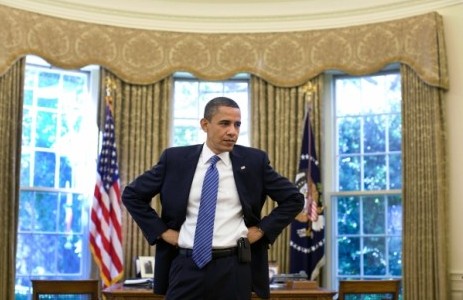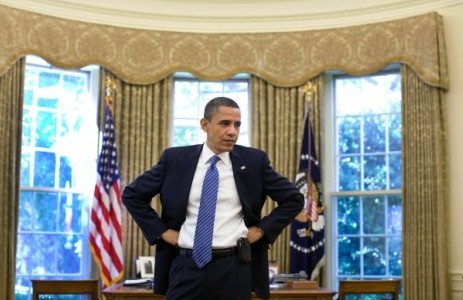 Cross-posted from the Wonk Room.
Cross-posted from the Wonk Room.
President Barack Obama is committed to throwing “the whole weight of the presidency” behind serious climate change reform, which he considers an “urgent priority.” In an interview with Rolling Stone publisher Jann Wenner and executive editor Eric Bates, Obama addressed the collapse of comprehensive climate legislation in the U.S. Senate and highlighted some of the steps his administration has taken in the absence of Congressional action: new fuel-economy standards and investments in renewable energy and retrofitting buildings, which he believes will lead to a 17 percent reduction in greenhouse gases from 2005 levels by 2020. When asked if he would “throw the whole weight of the presidency” behind climate policy as he did with health care and financial reform, Obama responded in the affirmative:
Yes. Not only can I foresee it, but I am committed to making sure that we get an energy policy that makes sense for the country and that helps us grow at the same time as it deals with climate change in a serious way. [Emphasis mine.]
“I’ve been here two years, guys,” Obama reminded. What is left undone of his campaign commitments — including climate legislation and immigration policy — “well, that’s what the next two years is for, or maybe the next six.” “Bringing about change is hard,” he concluded the interview. “But if people now want to take their ball and go home, that tells me folks weren’t serious in the first place.”
Obama recognized that solving the problem of free fossil fuel pollution may require that Congress “do it in chunks, as opposed to some sort of comprehensive omnibus legislation.” Unfortunately, the morass of political reality, darkened by $500 million of spending from coal and oil interests, does not reflect the real world. Our out-of-control climate does not merely have “the potential to have devastating effects on people around the globe,” as Obama argued, but has already destroyed the futures of millions of people, from Pakistan to Russia, from New Orleans to Nashville.
Check out part of the article:
James Hansen, the NASA scientist who is perhaps the most respected authority on global warming, says that climate change is the predominant moral issue of the 21st century, comparable to slavery faced by Lincoln and the response to Nazism faced by Churchill. Do you agree with that statement?
OBAMA: What I would agree with is that climate change has the potential to have devastating effects on people around the globe, and we’ve got to do something about it. In order to do something about it, we’re going to have to mobilize domestically, and we’re going to have to mobilize internationally.
During the past two years, we’ve not made as much progress as I wanted to make when I was sworn into office. It is very hard to make progress on these issues in the midst of a huge economic crisis, because the natural inclination around the world is to say, “You know what? That may be a huge problem, but right now what’s a really big problem is 10 percent unemployment,” or “What’s a really big problem is that our businesses can’t get loans.” That diverted attention from what I consider to be an urgent priority. The House of Representatives made an attempt to deal with the issue in a serious way. It wasn’t perfect, but it was serious. We could not get 60 votes for a comparable approach in the Senate.
One of my top priorities next year is to have an energy policy that begins to address all facets of our overreliance on fossil fuels. We may end up having to do it in chunks, as opposed to some sort of comprehensive omnibus legislation. But we’re going to stay on this because it is good for our economy, it’s good for our national security, and, ultimately, it’s good for our environment.
Understand, though, that even in the absence of legislation, we took steps over the past two years that have made a significant difference. I will give you one example, and this is an example where sometimes I think the progressive community just pockets whatever we do, takes it for granted, and then asks, “Well, why didn’t you get this done?”
We instituted the first increase in fuel-efficiency standards in this country in 30 years. It used to be that California would have some very rigorous rule, and then other states would have much weaker ones. Now we’ve got one rule. Not only that, it used to be that trucks weren’t covered, and there were all kinds of loopholes — that’s how SUVs were out there getting eight miles a gallon. Now everybody’s regulated — not only cars, but trucks. We did this with the agreement of the auto industry, which had never agreed to it before, we did it with the auto workers, who had never agreed to it before. We are taking the equivalent of millions of cars off the road, when it comes to the amount of greenhouse gases that are produced.
Is it enough? Absolutely not. The progress that we’re making on renewable energy, the progress that we’re making on retrofitting buildings and making sure that we are reducing electricity use — all those things, cumulatively, if we stay on it over the next several years, will allow us to meet the target that I set, which would be around a 17 percent reduction in our greenhouse gases.
But we’re going to have to do a lot more than that. When I talk to Steven Chu, who, by the way, was an unsung hero in the Gulf oil spill — this guy went down and helped design the way to plug that hole with BP engineers — nobody’s a bigger champion for the cause of reducing climate change than he is. When I ask him how we are going to solve this problem internationally, what he’ll tell you is that we can get about a third of this done through efficiencies and existing technologies, we can get an additional chunk through some sort of pricing in carbon, but ultimately we’re going to need some technological breakthroughs. So the investments we’re making in research and development around clean energy are also going to be important if we’re going to be able to get all the way there. Am I satisfied with what we’ve gotten done? Absolutely not.
Do you see a point at which you’re going to throw the whole weight of the presidency behind this, like you did on health care or financial reform?
OBAMA: Yes. Not only can I foresee it, but I am committed to making sure that we get an energy policy that makes sense for the country and that helps us grow at the same time as it deals with climate change in a serious way. I am just as committed to getting immigration reform done.
I’ve been here two years, guys. And one of the things that I just try to remember is that if we have accomplished 70 percent of what we committed to in the campaign, historic legislation, and we’ve got 30 percent of it undone — well, that’s what the next two years is for, or maybe the next six.



